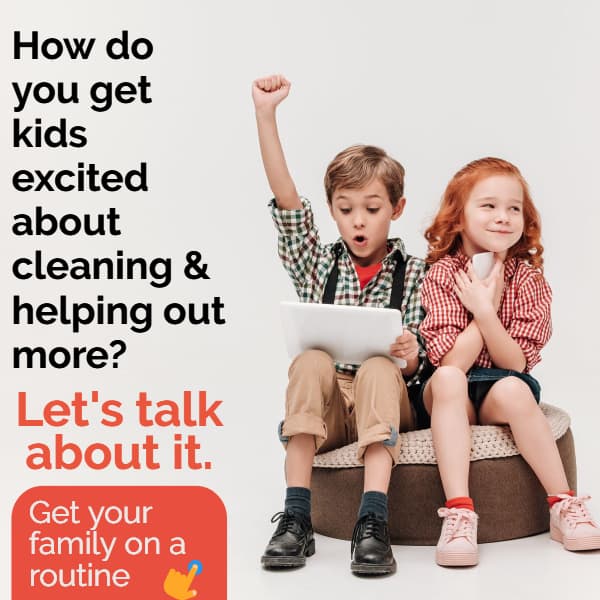That voice in your head tells you most of what you think about yourself. How can we change the dialogue in their brains to change their lives? Today, we’re going to talk about developing positive self-talk in kids.

You know the voice in your head.
We all have them. They don’t make us crazy, they make us who we are. The one who says:
Ugh, that was a mistake — you are so dumb
Or, the one that says…
TOTAL win, you ruled that room. You’re AWESOME!
Studies show it is really that voice that makes us who we are. Who gives us confidence and grit, or makes us shrink small and not try.
While I think it REALLY important to think about how that voice is talking to US — today, I want to talk about developing a positive voice in your kid’s heads.
If you’re looking to smooth out your day, for more positive interactions with your kids, I absolutely love this. The feedback from moms in the course is so positive! It can really make a difference!
Developing Positive Self-Talk In Children
Benefits of positive self-talk
You won’t always be around to be that positive talker for your kids.
And, frankly — I don’t want to be that for them. I need them doing it for themselves.
Nothing gives me more pride than my daughter just NAILING something (like a solo in a concert) and her looking at me and me smiling, but knowing that inside her head there are 400 cheerleaders telling her how amazing she is.
That is where the real win is.
And, personally, I find it more important in my daughter. Because I think (being a woman, so I really only have my own viewpoint here) that our voices are louder.

Coming to terms with your own self-talk
It was during a point during a lot of negativity that I really tried to change the voices in my head. I needed them to be cheering for me, rather than pointing out every shadow of impending doom.
Now that I’ve worked on thinking of myself more positively — I find that the main area I have a negative voice in my head is about my body.
So, I actively work on not passing that voice to my daughter.
It’s just something to be aware of.
Even if you have negative voices — you can still help your kids make a change.
Talking about self-talk
I think we don’t really want to say that we “hear voices”. But there is nothing wrong with that.
The difference with schizophrenia is that they think someone is actually talking to them, vs them talking to themselves. And that’s an important difference that keeps us grounded in reality.
For us, it started when they were young. When they had success I’d ask them if they were proud of themselves.
And now, that she’s older (she just turned 10) I will ask her what her voices in her head say.
There are times she has very positive voices.
But, I also notice that as soon as she gets down on herself she hears the negative voices. I almost always hear them come out as “I have no friends”. It’s been interesting to watch her (as an outsider) as I 100% feel that myself sometimes.
But, now when she is feeling positive I often ask her “hey, P — do you have friends?” and she smiles. She knows the voices in her head that say she has no friends are liars.
My daughter did the Girls on the Run program a few years ago and I really enjoyed how they encouraged girls to speak positively about themselves and others.

Breeding positivity in kids
We are in a negative society.
One of the ways to change the voice in our head is to change what comes out of our mouths.
I have really worked on being positive, and I hope that is rubbing off on my kids as well. I don’t like hearing negative things come out of their minds, and as you change your talk you change the voices in your head.
Again, it’s a work in progress, because I still think a lot of negative things, for sure.
Asking kids what the voices say
I think, during quiet moments — like car rides or times you’re making dinner together (that’s why I love our dinner routines) you can ask kids what the voices say.
- Tell them they can make a change in what the voices say.
- Tell them they are really in charge of their future, but those voices have a lot of input
Don’t harp on it, but bringing it up now and then (and also being honest about the voices in your head) it helps them make small changes for good.
Mostly, I think it’s important to know that everyone around us has those voices in their head.
We can help change those voices by compliments and positive talk. But, we can REALLY change them by helping our kids stay positive. It’s one of the best gifts we can give them.
I also really liked this book called “You Are Awesome” — daring kids to be brilliant!
Have you had luck helping your kids with their self-talk? Tell me in the comments, I’d love to know!
Please join my practical parenting series, and check out my other MomHacker posts below that!
[pt_view id=”a38f28df64″]










Michelle says
I’m a 59 (60 in August of 2019) woman. Most of my life I was a happy, positive, encouraging to self & others person. Sometime in my 40’s I started seeing the glass 1/2 empty, depression set in due to A LOT of negative self talk. Constant bombardment of negative thoughts, depression & anxiety just worsened. It all took the joy right out of my life. This little article about encouraging kids to reign in those thoughts & teach them how to be aware of them, control them, & change them works for grownups too! It literally changes how they/we feel about themselves & others. Thank you!!
Hilary Erickson says
I think it’s SO easy, and also pass those feelings onto our kids!